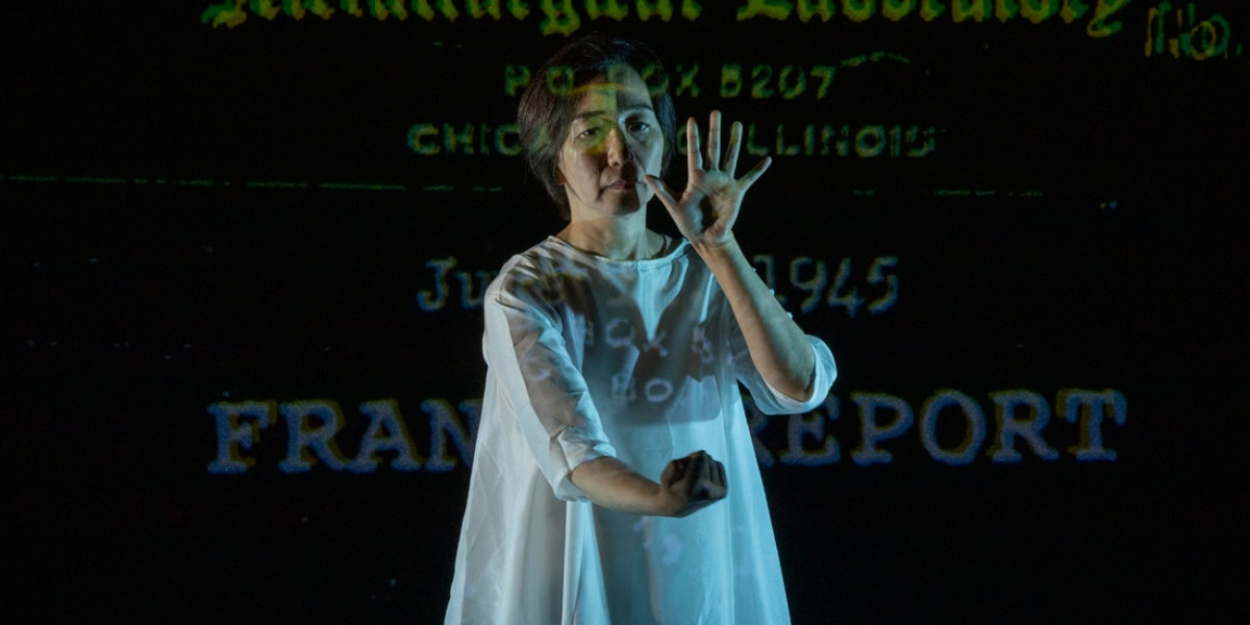Review: SCORED IN SILENCE – OZASIA FESTIVAL 2024 at Space Theatre, Adelaide Festival Centre
The experiences of deaf Japanese people, bombed in 1945.

Reviewed by Barry Lenny, Friday 25th October 2024.
Londin-based deaf Japanese artist, Chisato Minamimura, brings Scored in Silence to this year’s OzAsia Festival, telling the stories of deaf survivors of the 1945 atomic bombings near the end of WWII on the Japanese cities of Hiroshima and Nagasaki by the USA. Her performance uses BSL (British Sign Language) ASL/Auslan (Australian Sign Language), VV (Visual Vernacular) and English surtitles. Her extensive research includes moving videos of interviews with a couple of deaf survivors.
The survivors of these bombings are known as hibakusha, from hibaku (exposed), plus sha (person). About 650,000 people are recognised as hibakusha by the Japanese government. Over 100,00 are still living, spread throughout all 47 prefectures, and overseas.
Minamimura, wearing a simple, white shift, performs behind a Holo-Gauze, a modern, high-tech version of a scrim curtain. Text, images, and simple but very effective line drawings are projected onto this screen, creating 3D images. Those of us fortunate enough to secure seats in the front three rows were able to wear Woojer Belts, adding a further layer to the performance through the various vibrations transmitted to the body through these belts.
The performance covers the history of the attacks on Hiroshima and Nagasaki, the development of the nuclear bomb, the objections in The Franck Report of the scientists who developed that technology to its use on heavily populated cities, and the politics that caused the US government, under President Truman, to ignore that advice.
Minamimura goes on to explain the difference between the understandings of what happened as experienced by the deaf, as opposed to hearing people. Word of mouth and radio broadcasts were the main means of communication, so the deaf were effectively cut off from information. They had no idea what had happened, nor why.
Many survivors later suffered from the ignorance of those who had not been subject to the attacks, believing that radiation sickness could be transmitted, like a disease, or passed on to future generations, isolating and avoiding contact with those who had been subject to the bombings.
In this powerful and moving performance, Minamimura tells stories of some of the survivors, and two tell their own stories through the recorded interviews. The use of multiple means of communicating with the audience, through sound, vision, text, signing, and touch, makes for a rich experience, making it a more immersive performance than anything previous.
Her marvellously expressive combination of sign language, gestures, facial expressions, and choreography clearly conveys not only the facts and the stories, but also a vast emotional narrative, drawing the audience in for a captivating hour.
The technical aspects of the performance add greatly to the experience, too, thanks to Jon Armstrong’s lighting, Dave Packer’s animations, Danny Bright’s sound design, and the work of Vibrotactile Specialists, David Bobier and Jim Ruxton (VibrafusionLab).
The Q&A session following the performance on Friday evening gave insights into the development and implementation of the production, highlighting the contributions of all of those behind the scenes.
With only one performance remaining, at 2pm on Saturday, it is hoped that a return season might be on the cards next year, along with a new project that is in development. It will stay with those who saw this wonderful work for a long time to come.
Reader Reviews

Videos

